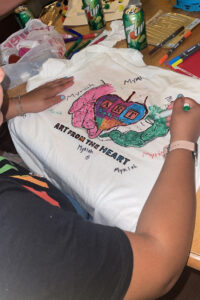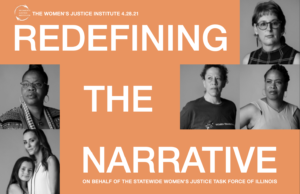THREE QUESTIONS: A Q&A with Heather Canuel, entrepreneur and founder of Art from the Heart
 Heather Canuel is a grantee partner of Illinois Humanities’ Envisioning Justice program, and a carceral justice activist whose work is linked to and fueled by her experiences with incarceration. An organizer for the Women’s Justice Institute, Heather provides hairstyling services to currently and formerly incarcerated people alongside her own work in the arts and humanities. In this Illinois Humanities Spotlight, Heather shares her vision of a just future and how emotional expression through the arts and humanities can serve as a form of therapy for children of incarcerated parents.
Heather Canuel is a grantee partner of Illinois Humanities’ Envisioning Justice program, and a carceral justice activist whose work is linked to and fueled by her experiences with incarceration. An organizer for the Women’s Justice Institute, Heather provides hairstyling services to currently and formerly incarcerated people alongside her own work in the arts and humanities. In this Illinois Humanities Spotlight, Heather shares her vision of a just future and how emotional expression through the arts and humanities can serve as a form of therapy for children of incarcerated parents.
Founded in 2020, Art from the Heart is a Bloomington-based organization whose mission is to allow children to learn about the arts, be creative, and develop a support system in a safe space with other children that have been through similar life experiences, as well as to allow open communication with the parents and loved ones who are incarcerated and be able to send them artwork. Art from the Heart will hold bimonthly meetings for children in Decatur to experience a safe space to learn about the arts, be creative, and get to know other children in the community who have similar lived experiences.
Q&A with Heather Canuel
Q: With regards to the criminal legal system, when you imagine a just future, what does it look like?
Heather Canuel: When I imagine a just future, it looks like a canal overflowing and peaceful. Each drop not a drop knowing where another drop has come from, yet traveling in peace and harmony — with flow and purpose. Basically, the opportunity for individuals to not have their pasts held against them. Lives with no judgement ever based on race, religion, size, gender, geographic separation, segregation, or bias.
I am a downstate organizer for the Women’s Justice Institute. We did a report earlier this year and gave it to Governor JB Pritzker. We took his wife, Mary Kathryn Muenster, on a tour of a local prison. We identified 10 steps towards a just future. We can secure access to real justice by creating safety for families, lifting communities, protecting fiscal and human resources, and more. It’s about liberation and transformation across different sectors and systems. Cook County is great in terms of access to resources; downstate Illinois, not so much.

Q: How do you see harnessing the arts and humanities as important strategies in working toward that future?
HC: I see art and all its mediums as therapeutic, healing, creative, positive, vibrating energy that enables healing from the past. Art helps people work towards a good future as a model and a ripple in the pond — to eventually make a wave of change with all its efforts.
Studies show that art is emotional therapy. Half of these children are under the age of 10. They cannot express themselves emotionally as adults can, so art is the easiest way for them to express themselves and deal with emotions.
Q: What is the most important thing people should know about your work?
HC: The most important thing people should know about my work is that in America almost 3% of our youth (categorized as under 18 years of age) have either a mother or father who is currently Incarcerated. This is 3% of American youth that are hurting. I want to help establish a support system for these children complete with healing therapies of art and peers going through similar circumstances as a reminder they are not alone. Secondly, I want everyone to know that if we all make that ripple, eventually it will cause that wave of change.
Q: Anything else you’d like to add?
HC: There is a Rutgers University report that lays out the demographics. For example, more than 2.7 million children in the U.S. have an incarcerated parent. That is 1 in 28 children. Approximately half of children with incarcerated parents are under 10 years old. Sixty-seven percent of parents who are incarcerated were handcuffed in front of their children, often with weapons drawn in front of the children. The numbers speak for themselves.
Heather’s Recommended Reading:
 The Women’s Justice Institute report “Redefining the Narrative” (April, 2021)
The Women’s Justice Institute report “Redefining the Narrative” (April, 2021)
The Illinois Humanities Spotlight
On a monthly basis, Illinois Humanities highlights the work of our Envisioning Justice program partners through our “Grantee Spotlight.” This shines a light on our grantee partner’s work, offering details about the organization and the funded project, as well as a Q&A with a team member at the organization. Read more
About Envisioning Justice
Envisioning Justice leverages the arts and humanities to envision alternatives to the enduring injustice of mass incarceration. This Illinois Humanities initiative works with communities and people impacted by mass incarceration to spark conversations and illuminate community-based strategies that address our racist and unjust criminal legal system.
About Illinois Humanities
Illinois Humanities, the Illinois affiliate of the National Endowment for the Humanities, is a statewide nonprofit organization that activates the humanities through free public programs, grants, and educational opportunities that foster reflection, spark conversation, build community and strengthen civic engagement. We provide free, high-quality humanities experiences throughout Illinois, particularly for communities of color, individuals living on low incomes, counties and towns in rural areas, small arts and cultural organizations, and communities highly impacted by mass incarceration. Founded in 1974, Illinois Humanities is supported by state, federal, and private funds.